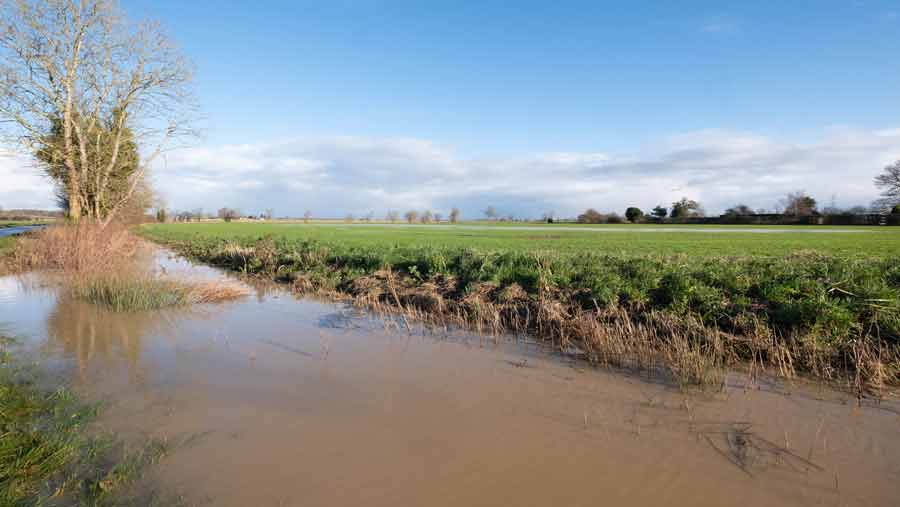Farmers demand government action as crops submerge
 © Tim Scrivener
© Tim Scrivener With large swathes of farmland under water and with more heavy rainfall predicted in the coming days, the NFU has called on government to commit to a comprehensive water management strategy.
After an unseasonably wet harvest this year, farmers in some parts of the country are seeing next year’s crops rotting under floodwater.
NFU deputy president Tom Bradshaw has called it a “perfect storm” with financial burdens, the phase-out of government support, widespread crop losses, and on-farm running costs at an all-time high.
See also: Storm Babet wreaks flooding havoc on Scottish farms
He said: “The farming community has been impacted with hundreds of acres of productive farmland under water and land that’s now inaccessible.
“Crops that are in the ground are likely to rot, meaning the output and profitability of next year’s harvest is already seriously compromised, building on an unprecedented year in terms of weather and cost.”
Promises not reflected in policies
Despite recent promises from government to support UK food security, Mr Bradshaw says this is not being reflected in policies, particularly around food production and how water infrastructure is managed.
“Farming is on the frontline of climate change and the sector is experiencing volatility and severe weather events more often,” he said.
“It’s why we absolutely need a long-term plan to improve how we manage water in times of flood and drought, as we regularly experience both on an annual basis, and both severely impact our ability to produce food.”
A comprehensive water management strategy should include significant public investment, with ambitious upgrades of ageing rural flood defences, drainage and waterways as well as regular maintenance.
“We also need to look at where farming protects adjacent urban areas by absorbing and holding floodwater at personal cost to the farms themselves.
“These businesses must be reimbursed for the public goods being provided.”
Hard hit
The East Midlands has been particularly hard hit in recent days, with potato and sugar beet ground underwater.
Floods around Bardney in Lincolnshire on @ArmstrngDavid’s farm. If potatoes go up in price …….. these under the water won’t get harvested. pic.twitter.com/msIOfUB2Up
— Andrew Ward 🇬🇧🚜 (@wheat_daddy) October 23, 2023
Lincolnshire farmer Andrew Ward says that lessons from the 2019 floods have not been learned, and the Environment Agency has once again let down farmers.
“The problem we’ve got is that these are all areas that flooded back in 2019,” he explained. “Every time we have a flood, there are lessons that they could have learned, but they never implement them or act on them.
“The Environment Agency is just not realising the seriousness of it. They are uncontactable, they will not communicate with any farmers, you can’t get hold of them.
“They haven’t been out to see any of the farms that have flooded, to say ‘sorry our river banks have failed or collapsed’.”
Funding cuts
Mr Ward says there are two big problems.
“The government keeps cutting the funding all the time, and the funding they do have is spent on things such as moving badgers in the banks. They are spending it on the wrong things.”
“There was some work done on a river a few months ago near Lincoln, but they had to leave areas and couldn’t continue because of voles in the bank.
“If you go out to these areas now that have flooded, there are dead voles everywhere, floating on the edge of the water.
“How much wildlife has drowned as a result of the flooding? Everything we’ve done for wildlife is all undone with this flood.”
Looks familiar? Thanks to the @EnvAgency, it should be. This same farm flooded in 2019 and was under water for 2 months. No compensation for @Henry_Ward91 then and nothing this time. The EA listen to environmentalists and not farmers. The wildlife is always their argument but… pic.twitter.com/Bp8icOD1KP
— Andrew Ward 🇬🇧🚜 (@wheat_daddy) October 23, 2023
